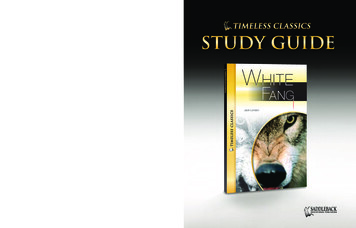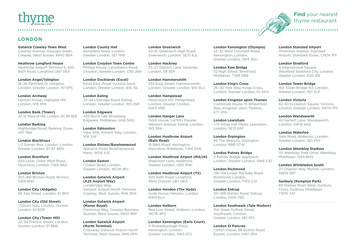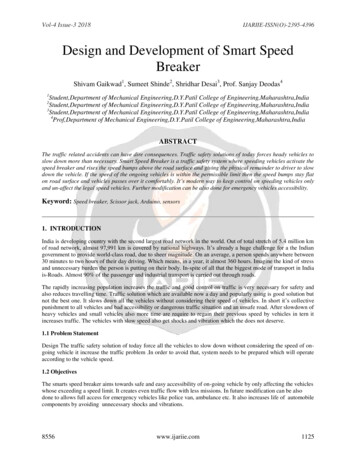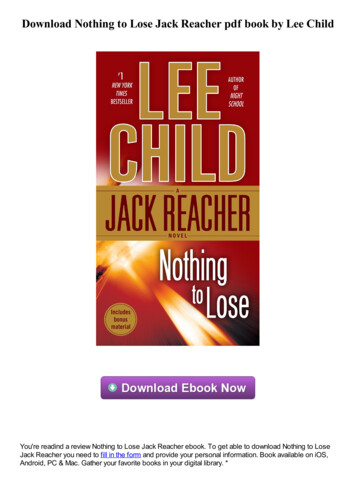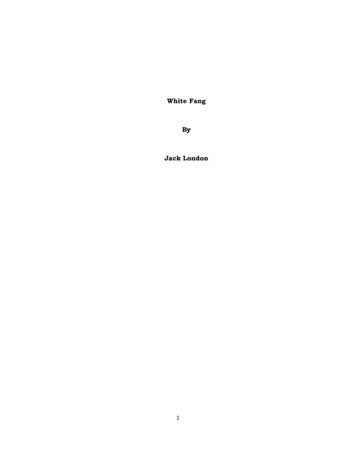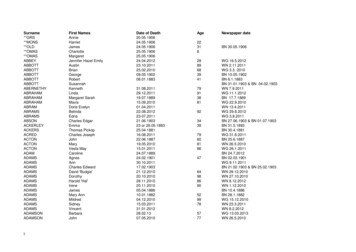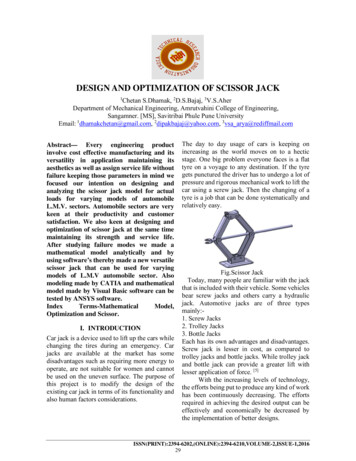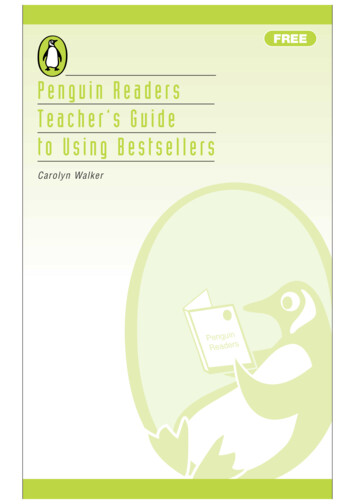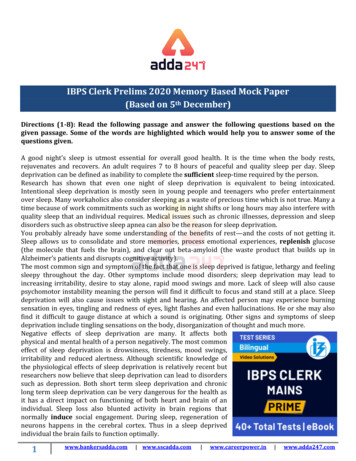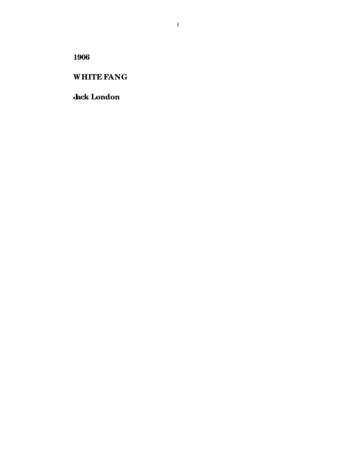
Transcription
11906WHITE FANGJack London
2London, Jack (1876-1916) - A self-educated American adventurenovelist who was a sailor, a tramp, and a gold miner before hebegan his writing career.His work had constant themes of survival and compassion forthe underdog.White Fang (1906) - White Fang, three-fourths wolf and onefourth dog, develops a reputation as the fiercest dog in thenorthwest. A complementary tale to The Call of the Wild, it tellsof the gradual domestication of a wild dog rather than thereversion of a house dog to the wild.
3Table Of ContentsPART ONE CHAPTER ONE . . . . . . . . .5The Trail of the Meat.CHAPTER TWO. . . . . . . . . . . . . . .11The She-wolf.CHAPTER THREE. . . . . . . . . . . . . .19The Hunger Cry.PART TWO CHAPTER ONE. . . . . . . . . . .28The Battle of the Fangs.CHAPTER TWO. . . . . . . . . . . . . . .36The Lair.CHAPTER THREE. . . . . . . . . . . . . .43The Gray Cub.CHAPTER FOUR. . . . . . . . . . . . . . .47The Wall of the World.CHAPTER FIVE. . . . . . . . . . . . . . .56The Law of Meat.PART THREE CHAPTER ONE. . . . . . . . . . . 61The Makers of Fire.CHAPTER TWO. . . . . . . . . . . . . . .70The Bondage.CHAPTER THREE. . . . . . . . . . . . . .77The Outcast.CHAPTER FOUR. . . . . . . . . . . . . . .81The Trail of the Gods.CHAPTER FIVE. . . . . . . . . . . . . . .85The Covenant.CHAPTER SIX. . . . . . . . . . . . . . 92The Famine.PART FOUR CHAPTER ONE. . . . . . . . . .99The Enemy of his Kind.CHAPTER TWO. . . . . . . . . . . . . . . 107The Mad God.CHAPTER THREE. . . . . . . . . . . . . . 114The Reign of HateCHAPTER FOUR. . . . . . . . . . . . . .118The Clinging Death.CHAPTER FIVE. . . . . . . . . . . . . . .127The Indomitable.CHAPTER SIX. . . . . . . . . . . . .131The Love-master.
4PART FIVE CHAPTER ONE.The Long Trail.CHAPTER TWO. . . . .The Southland.CHAPTER THREE. . . .The God’s Domain.CHAPTER FOUR. . . . .The Call of Kind.CHAPTER FIVE. . . . .The Sleeping Wolf. 142.146.151.159164
5PART ONECHAPTER ONEThe Trail of the Meat.DARK SPRUCE FOREST frowned on either side the frozenwaterway. The trees had been stripped by a recent wind of theirwhite covering of the frost, and they seemed to lean toward eachother, black and ominous, in the fading light. A vast silencereigned over the land. The land itself was a desolation, lifeless,without movement, so lone and cold that the spirit of it was noteven that of sadness.There was a hint in it of laughter, but of a laughter more terriblethan any sadnessa laughter that was mirthless as the smile of theSphinx, a laughter cold as the frost and partaking of the grimnessof infallibility. It was the masterful and incommunicable wisdomof eternity laughing at the futility of life and the effort of life.It was the Wild, the savage, frozen-hearted Northland Wild.But there was life, abroad in the land and defiant. Down the frozenwaterway toiled a string of wolfish dogs. Their bristly fur wasrimed with frost. Their breath froze in the air as it left their mouths,spouting forth in spumes of vapor that settled upon the hair oftheir bodies and formed into crystals of frost. Leather harness wason the dogs, and leather traces attached them to a sled whichdragged along behind. The sled was without runners. It was madeof stout birchbark, and its full surface rested on the snow. The frontend of the sled was turned up, like a scroll in order to force downand under the bore of soft snow that surged like a wave before it.On the sled, securely lashed, was a long and narrow oblong box.There were other things on the sled-blankets, an axe, and acoffeepot and frying-pan; but prominent, occupying most of thespace, was the long and narrow oblong box.In advance of the dogs, on wide snowshoes, toiled a man. At therear of the sled toiled a second man. On the sled, in the box, lay athird man whose toil was over- a man whom the Wild hadconquered and beaten down until he would never move norstruggle again. It is not the way of the Wild to like movement.Life is an offense to it, for life is movement; and the Wild aimsalways to destroy movement. It freezes the water to prevent itrunning to the sea; it drives the sap out of the trees till they arefrozen to their mighty hearts; and most ferociously and terribly ofall does the Wild harry and crush into submission man- man, who
6is the most restless of life, ever in revolt against the dictum that allmovement must in the end come to the cessation of movement.But at front and rear, unawed and indomitable, toiled the two menwho were not yet dead. Their bodies were covered with fur andsoft-tanned leather. Eyelashes and cheeks and lips were so coatedwith the crystals from their frozen breath that their faces were notdiscernible. This gave them the seeming of ghostly masques,undertakers in a spectral world at the funeral of some ghost.But under it all they were men, penetrating the land of desolationand mockery and silence, puny adventurers bent on colossaladventure, pitting themselves against the might of a world asremote and alien and pulseless as the abysses of space.They traveled on without speech, saving their breath for the workof their bodies. On every side was the silence, pressing upon themwith a tangible presence.It affected their minds as the many atmospheres of deep wateraffect the body of the diver. It crushed them with the weight ofunending vastness and unalterable decree. It crushed them into theremotest recesses of their own minds, pressing out of them, likejuices from the grape, all the false ardors and exaltations andundue self-values of the human soul, until they perceivedthemselves finite and small, specks and motes, moving with weakcunning and little wisdom amidst the play and interplay of thegreat blind elements and forces.An hour went by, and a second hour. The pale light of the shortsunless day was beginning to fade, when a faint far cry arose onthe still air. It soared upward with a swift rush, till it reached itstopmost note, where it persisted, palpitant and tense, and thenslowly died away. It might have been a lost soul wailing, had it notbeen invested with a certain sad fierceness and hungry eagerness.The front man turned his head until his eyes met the eyes of theman behind. And then, across the narrow oblong box, each noddedto the other.A second cry arose, piercing the silence with needlelike shrillness.Both men located the sound. It was to the rear, somewhere in thesnow expanse they had just traversed. A third and answering cryarose, also to the rear and to the left of the second cry.‘They’re after us, Bill,’ said the man at the front.His voice sounded hoarse and unreal, and he had spoken withapparent effort.‘Meat is scarce,’ answered his comrade. ‘I ain’t seen a rabbit signfor days.’ Thereafter they spoke no more, though their ears werekeen for the huntingcries that continued to rise behind them.
7At the fall of darkness they swung the dogs into a cluster of sprucetrees on the edge of the waterway and made a camp. The coffin, atthe side of the fire, served for seat and table. The wolf-dogs,clustered on the far side of the fire, snarled and bickered amongthemselves, but evinced no inclination to stray off into thedarkness.‘Seems to me, Henry, they’re stayin’ remarkable close to camp,’ Billcommented.Henry, squatting over the fire and settling the pot of coffee with apiece of ice, nodded. Nor did he speak till he had taken his seat onthe coffin and begun to eat.‘They know where their hides is safe,’ he said. ‘They’d sooner eatgrub than be grub. They’re pretty wise, them dogs.’ Bill shook hishead. ‘Oh, I don’t know.’ His comrade looked at him curiously.‘First time I ever heard you say anythin’ about their not bein’ wise.’‘Henry,’ said the other, munching with deliberation the beans hewas eating, ‘did you happen to notice the way them dogs kickedup when I was a-feedin’ ‘em?’‘They did cut up more’n usual,’ Henry acknowledged.‘How many dogs’ve we got, Henry?’ ‘Six.’ ‘Well, Henry.’ Billstopped for a moment, in order that his words might gain greatersignificance. ‘As I was sayin’, Henry, we’ve got six dogs. I took sixfish out of the bag. I gave one fish to each dog, an’, Henry, I wasone fish short.’ ‘You counted wrong.’ ‘We’ve got six dogs,’ theother reiterated dispassionately. ‘I took out six fish.One Ear didn’t get no fish. I come back to the bag afterward an’ got‘m his fish.’ ‘We’ve only got six dogs,’ Henry said.‘Henry,’ Bill went on, ‘I won’t say they was all dogs, but there wasseven of ‘m that got fish.’ Henry stopped eating to glance across thefire and count the dogs.‘There’s only six now,’ he said.‘I saw the other one run off across the snow,’ Bill announced withcool positiveness. ‘I saw seven.’ His comrade looked at himcommiseratingly, and said, ‘I’ll be almightly glad when this trip’sover.’ ‘What d’ye mean by that?’ Bill demanded.‘I mean that this load of ourn is gettin’ on your nerves, an’ thatyou’re beginnin’ to see things.’ ‘I thought of that,’ Bill answeredgravely. ‘An’ so, when I saw it run off across the snow, I looked inthe snow an’ saw its tracks. Then I counted the dogs an’ there wasstill six of ‘em. The tracks is there in the snow now. D’ye want tolook at ‘em? I’ll show ‘m to you.’ Henry did not reply, butmunched on in silence, until, the meal finished, he topped it with afinal cup of coffee. He wiped his mouth with the back of his handand said:
8‘Then you’re thinkin’ as it was-’ A long wailing cry, fiercely sad,from somewhere in the darkness, had interrupted him. He stoppedto listen to it, then he finished his sentence with a wave of his handtoward the sound of the cry, ‘- one of them?’ Bill nodded. ‘I’d ablame sight sooner think that than anything else. You noticedyourself the row the dogs made.’ Cry after cry, and answeringcries, were turning the silence into a bedlam.From every side the cries arose, and the dogs betrayed their fear byhuddling together and so close to the fire that their hair wasscorched by the heat. Bill threw on more wood, before lighting hispipe.‘I’m thinkin’ you’re down in the mouth some,’ Henry said.‘Henry.’ He sucked meditatively at his pipe for some time beforehe went on. ‘Henry, I was a-thinkin’ what a blame sight luckier heis than you an’ me’ll ever be.’ He indicated the third person by adownward thrust of the thumb to the box on which they sat.‘You an’ me Henry, when we die, we’ll be lucky if we get enoughstones over our carcasses to keep the dogs off of us.’ ‘But we ain’tgot people an’ money an’ all the rest, like him,’ Henry rejoined.‘Long-distance funerals is somethin’ you an’ me can’t exactlyafford.’ ‘What gets me, Henry, is what a chap like this, that’s a lordor something in his own country, and that’s never had to botherabout grub nor blankets, why he comes a-buttin’ round the Godforsaken ends of the earth- that’s what I can’t exactly see.’ ‘Hemight have lived to a ripe old age if he’d stayed to home,’ Henryagreed.Bill opened his mouth to speak, but changed his mind. Instead, hepointed toward the wall of darkness that pressed about them fromevery side. There was no suggestion of form in the utter blackness;only could be seen a pair of eyes gleaming like live coals. Henryindicated with his head a second pair, and a third. Now and againa pair of eyes moved, or disappeared to appear again a momentlater.The unrest of the dogs had been increasing, and they stampeded,in a surge of sudden fear, to the near side of the fire, cringing andcrawling about the legs of the men. In the scramble one of the dogshad been overturned on the edge of the fire, and it had yelped withpain and fright as the smell of its singed coat possessed the air. Thecommotion caused the circle of eyes to shift restlessly for a momentand even to withdraw a bit, but it settled down again as the dogsbecame quiet.‘Henry, it’s a blame misfortune to be out of ammunition.’ Bill hadfinished his pipe, and was helping his companion spread the bedof fur and blanket upon the spruce boughs which he had laid over
9the snow before supper. Henry grunted, and began unlacing hismoccasins.‘How many cartridges did you say you had left?’ he asked.‘Three,’ came the answer. ‘An’ I wisht ‘twas three hundred. ThenI’d show ‘em what for, damn ‘em!’ He shook his fist angrily at thegleaming eyes, and began securely to prop his moccasins beforethe fire.‘An’ I wisht this cold snap’d break,’ he went on. ‘It’s been fiftybelow for two weeks now. An’ I wisht I’d never started on this trip,Henry. I don’t like the looks of it. I don’t feel right, somehow. An’while I’m wishin’, I wisht the trip was over an’ done with, an’ youan’ me a-sittin’ by the fire in Fort McGurry just about now an’playin’ cribbage- that’s what I wisht.’ Henry grunted and crawledinto bed. As he dozed off he was aroused by his comrade’s voice.‘Say, Henry, that other one that come in an’ got a fish- why didn’tthe dogs pitch into it? That’s what’s botherin’ me.’ ‘You’rebotherin’ too much, Bill,’ came the sleepy response. ‘You was neverlike this before. You jes’ shut up now, an’ go to sleep, an’ you’ll beall hunkydory in the mornin’. Your stomach’s sour, that’s what’sbotherin’ you.’ The men slept, breathing heavily, side by side,under the one covering. The fire died down, and the gleaming eyesdrew closer the circle they had flung about the camp. The dogsclustered together in fear, now and again snarling menacingly as apair of eyes drew close. Once their uproar became so loud that Billwoke up. He got out of bed carefully, so as not to disturb the sleepof his comrade, and threw more wood on the fire. As it began toflame up, the circle of eyes drew farther back. He glanced casuallyat the huddling dogs. He rubbed his eyes and looked at them moresharply. Then he crawled back into the blankets.‘Henry,’ he said. ‘Oh, Henry.’ Henry groaned as he passed fromsleep to waking, and demanded, ‘What’s wrong now?’ ‘Nothin’,’came the answer; ‘only there’s seven of ‘em again. I just counted.’Henry acknowledged receipt of the information with a grunt thatslid into a snore as he drifted back into sleep.In the morning it was Henry who awoke first and routed hiscompanion out of bed. Daylight was yet three hours away, thoughit was already six o’clock; and in the darkness Henry went aboutpreparing breakfast, while Bill rolled the blankets and made thesled ready for lashing.‘Say, Henry,’ he asked suddenly, ‘how many dogs did you say wehad?’ ‘Six.’ ‘Wrong,’ Bill proclaimed triumphantly.‘Seven again?’ Henry queried.‘No, five; one’s gone.’ ‘The hell!’ Henry cried in wrath, leaving thecooking to come and count the dogs.
10‘You’re right, Bill,’ he concluded. ‘Fatty’s gone.’ ‘An’ he went likegreased lightnin’ once he got started. Couldn’t ‘ve seen ‘m forsmoke.’ ‘No chance at all,’ Henry concluded. ‘They jes’ swallowed‘m alive. I bet he was yelpin’ as he went down their throats, damn‘em!’ ‘He always was a fool dog,’ said Bill.‘But no fool dog ought to be fool enough to go off an’ commitsuicide that way.’ He looked over the remainder of the team with aspeculative eye that summed up instantly the salient traits of eachanimal. ‘I bet none of the others would do it.’‘Couldn’t drive ‘em away from the fire with a club,’ Bill agreed. ‘Ialways did think there was somethin’ wrong with Fatty, anyway.’And this was the epitaph of a dead dog on the Northland trail- lessscant than the epitaph of many another dog, of many a man.
11CHAPTER TWO.The She-wolf.BREAKFAST EATEN AND the slim camp-outfit lashed to the sled,the men turned their backs on the cheery fire and launched out intothe darkness. At once began to rise the cries that were fiercely sadcries that called through the darkness and cold to one another andanswered back. Conversation ceased. Daylight came at nineo’clock. At midday the sky to the south warmed to a rose-color,and marked where the bulge of the earth intervened between themeridian sun and the northern world. But the rose-color swiftlyfaded. The gray light of day that remained lasted until threeo’clock, when it, too, faded, and the pall of the Arctic nightdescended upon the lone and silent land.As darkness came on, the hunting-cries to right and left and reardrew closerso close that more than once they sent surges of fearthrough the toiling dogs, throwing them into short-lived panics.At the conclusion of one such panic, when he and Henry had gotthe dogs back in the traces, Bill said:‘I wisht they’d strike game somewheres, an’ go away an’ leave usalone.’ ‘They do get on the nerves horrible,’ Henry sympathized.They spoke no more until camp was made.Henry was bending over and adding ice to the bubbling pot ofbeans when he was startled by the sound of a blow, andexclamation from Bill, and a sharp snarling cry of pain from amongthe dogs. He straightened up in time to see a dim formdisappearing across the snow into the shelter of the dark. Then hesaw Bill, standing amid the dogs, half triumphant, half crestfallen,in one hand a stout club, in the other the tail and part of the bodyof a sun-cured salmon.‘It got half of it,’ he announced; ‘but I got a whack at it jes’ thesame. D’ye hear it squeal?’ ‘What’d it look like?’ Henry asked.‘Couldn’t see. But it had four legs an’ a mouth an’ hair an’ lookedlike any dog.’ ‘Must be a tame wolf, I reckon.’ ‘It’s damned tame,whatever it is, comin’ in here at feedin’ time an’ gettin’ its whack offish.’ That night, when supper was finished and they sat on theoblong box and pulled at their pipes, the circle of gleaming eyesdrew in even closer than before.‘I wisht they’d spring up a bunch of moose or somethin’, an’ goaway an’ leave us alone,’ Bill said.Henry grunted with an intonation that was not all sympathy andfor a quarter of an hour they sat on in silence, Henry staring at the
12fire, and Bill at the circle of eyes that burned in the darkness justbeyond the firelight.‘I wisht we were pullin’ into McGurry right now,’ he began again.‘Shut up your wishin’ an’ your croakin’, Henry burst out angrily.‘Your stomach’s sour. That’s what’s ailin’ you. Swallow a spoonfulof sody, an’ you’ll sweeten up wonderful an’ be more pleasantcompany.’ In the morning, Henry was aroused by fervidblasphemy that proceeded from the mouth of Bill. Henry proppedhimself up on an elbow and looked to see his comrade standingamong the dogs beside the replenished fire, his arms raised inobjurgation, his face distorted with passion.‘Hello!’ Henry called. ‘What’s up now?’ ‘Frog’s gone,’ came theanswer.‘No.’ ‘I tell you yes.’ Henry leaped out of the blankets and to thedogs. He counted them with care, and then joined his partner incursing the powers of the Wild that had robbed them of anotherdog.‘Frog was the strongest of the bunch,’ Bill pronounced finally.‘An’ he was no fool dog neither,’ Henry added.And so was recorded the second epitaph in two days.A gloomy breakfast was eaten, and the four remaining dogs wereharnessed to the sled. The day was a repetition of the days that hadgone before. The men toiled without speech across the face of thefrozen world. The silence was unbroken save by the cries of theirpursuers, that, unseen, hung upon their rear. With the coming ofnight in the mid-afternoon, the cries sounded closer as the pursuersdrew in according to their custom; and the dogs grew excited andfrightened, and were guilty of panics that tangled the traces andfurther depressed the two men.‘There, that’ll fix you fool critters,’ Bill said with satisfaction thatnight, standing erect at completion of his task.Henry left his cooking to come and see. Not only had his partnertied the dogs up, but he had tied them, after the Indian fashion,with sticks. About the neck of each dog he had fastened the leatherthong. To this, and so close to the neck that the dog could not gethis teeth to it, he had tied a stout stick four or five feet in length.The other end of the stick, in turn, was made fast to a stake in theground by means of a leather thong. The dog was unable to gnawthrough the leather at his own end of the stick. The stick preventedhim from getting at the leather that fastened the other end.Henry nodded his head approvingly.‘It’s the only contraption that’ll ever hold One Ear,’ he said. ‘He cangnaw through leather as clean as a knife an’ jes’ about half asquick. They all ‘ll be here in the mornin’ hunky-dory.’ ‘You jes’ bet
13they will,’ Bill affirmed. ‘If one of ‘em turns up missin’, I’ll gowithout my coffee.’‘They jes’ know we ain’t loaded to kill,’ Henry remarked atbedtime, indicating the gleaming circle that hemmed them in. ‘Ifwe could put a couple of shot into ‘em, they’d be more respectful.They come closer every night. Get the firelight out of your eyes an’look hard- there! Did you see that one?’ For some time the two menamused themselves with watching the movement of vague formson the edge of the firelight. By looking closely and steadily atwhere a pair of eyes burned in the darkness, the form of the animalwould slowly take shape. They could even see these forms move attimes.A sound among the dogs attracted the men’s attention. One Earwas uttering quick, eager whines, lunging at the length of his sticktoward the darkness, and desisting now and again in order tomake frantic attacks on the stick with his teeth.‘Look at that, Bill,’ Henry whispered.Full into the firelight, with a stealthy, sidelong movement, glided adoglike animal. It moved with commingled mistrust and daring,cautiously observing the men, its attention fixed on the dogs. OneEar strained the full length of the stick toward the intruder andwhined with eagerness.‘That fool One Ear don’t seem scairt much,’ Bill said in a low tone.‘It’s a she-wolf,’ Henry whispered back, ‘an’ that accounts for Fattyan’ Frog.She’s the decoy for the pack. She draws out the dog an’ then all therest pitches in an’ eats ‘m up.’The fire crackled. A log fell apart with a loud spluttering noise. Atthe sound of it the strange animal leaped back into the darkness.‘Henry, I’m a-thinkin’,’ Bill announced.‘Thinkin’ what?’ ‘I’m a-thinkin’ that was the one I lambasted withthe club.’ ‘Ain’t the slightest doubt in the world,’ was Henry’sresponse.‘An’ right here I want to remark,’ Bill went on, ‘that that animal’sfamilyarity with campfires is suspicious an’ immoral.’ ‘It knows forcertain more’n a self-respectin’ wolf ought to know,’ Henry agreed.‘A wolf that knows enough to come in with the dogs at feedin’ timehas had experiences.’ ‘Ol’ Villan had a dog once that run awaywith the wolves,’ Bill cogitated aloud. ‘I ought to know. I shot itout of the pack in a moose pasture over on Little Stick. An’ Ol’Villan cried like a baby. Hadn’t seen it for three years, he said.Ben with the wolves all that time.’ ‘I reckon you’ve called the turn,Bill. That wolf’s a dog, an’ it’s eaten fish many’s the time from thehand of man.’ ‘An’ if I get a chance at it, that wolf that’s a dog’ll be
14jes’ meat,’ Bill declared. ‘We can’t afford to lose no more animals.’‘But you’ve only got three cartridges,’ Henry objected.‘I’ll wait for a dead sure shot,’ was the reply.In the morning Henry renewed the fire and cooked breakfast to theaccompaniment of his partner’s snoring.‘You was sleepin’ jes’ too comfortable for anythin’,’ Henry toldhim, as he routed him out for breakfast. ‘I hadn’t the heart to rouseyou.’ Bill began to eat sleepily. He noticed that his cup was emptyand started to reach for the pot. But the pot was beyond arm’slength and beside Henry.‘Say, Henry,’ he chided gently, ‘ain’t you forgot somethin’?’ Henrylooked about with great carefulness and shook his head. Bill heldup the empty cup.‘You don’t get no coffee,’ Henry announced.‘Ain’t run out?’ Bill asked anxiously.‘Nope.’ ‘Ain’t thinkin’ it’ll hurt my digestion?’ ‘Nope.’ A flush ofangry blood pervaded Bill’s face.‘Then it’s jes’ warm an’ anxious I am to be hearin’ you explainyourself,’ he said.‘Spanker’s gone,’ Henry answered.Without haste, with the air of one resigned to misfortune, Billturned his head, and from where he sat counted the dogs.‘How’d it happen?’ he asked apathetically.Henry shrugged his shoulders. ‘Don’t know. Unless One Eargnawed ‘m loose. He couldn’t a-done it himself, that’s sure.’ ‘Thedarned cuss.’ Bill spoke gravely and slowly, with no hint of theanger that was raging within. ‘Jes’ because he couldn’t chewhimself loose, he chews Spanker loose.’ ‘Well, Spanker’s troubles isover, anyway; I guess he’s digested by this time an’ cavortin’ overthe landscape in the bellies of twenty different wolves,’ wasHenry’s epitaph on this, the latest lost dog. ‘Have some coffee, Bill.’But Bill shook his head.‘Go on,’ Henry pleaded, elevating the pot.Bill shoved his cup aside. ‘I’ll be ding-dong-danged if I do. I said Iwouldn’t if any dog turned up missin’, an’ I won’t.’ ‘It’s darn goodcoffee,’ Henry said enticingly.But Bill was stubborn, and he ate a dry breakfast, washed downwith mumbled curses at One Ear for the trick he had played.‘I’ll tie ‘em up out of reach of each other tonight,’ Bill said, as theytook the trail.They had traveled little more than a hundred yards, when Henry,who was in front, bent down and picked up something with whichhis snowshoe had collided.
15It was dark, and he could not see it, but he recognized it by thetouch. He flung it back, so that it struck the sled and bounced alonguntil it fetched up on Bill’s snowshoes.‘Mebbee you’ll need that in your business,’ Henry said.Bill uttered an exclamation. It was all that was left of Spanker- thestick with which he had been tied.‘They ate ‘m hide an’ all,’ Bill announced. ‘The stick’s as clean as awhistle.They’ve ate the leather offen both ends. They’re damn hungry,Henry, an’ they’ll have you an’ me guessin’ before his trip’s over.’Henry laughed defiantly. ‘I ain’t been trailed this way by wolvesbefore, but I’ve gone through a whole lot worse an’ kept my health.Takes more’n a handful of them pesky critters to do for yours truly,Bill, my son.’ ‘I don’t know, I don’t know,’ Bill mutteredominously.‘Well, you’ll know all right when we pull into McGurry.’ ‘I ain’tfeelin’ special enthusiastic,’ Bill persisted.‘You’re off color, that’s what’s the matter with you,’ Henrydogmatized.‘What you need is quinine, an’ I’m goin’ to dose you up stiff assoon as we make McGurry.’Bill grunted his disagreement with the diagnosis, and lapsed intosilence. The day was like all the days. Light came at nine o’clock.At twelve o’clock the southern horizon was warmed by the unseensun; and then began the cold gray of afternoon that would merge,three hours later, into night.It was just after the sun’s futile effort to appear that Bill slipped therifle from under the sled-lashings and said:‘You keep right on, Henry, I’m goin’ to see what I can see.’ ‘You’dbetter stick by the sled,’ his partner protested. ‘You’ve only gotthree cartridges, an’ there’s no tellin’ what might happen.’ ‘Who’scroakin’ now?’ Bill demanded triumphantly.Henry made no reply, and plodded on alone, though often he castanxious glances back into the gray solitude where his partner haddisappeared. An hour later, taking advantage of the cut-offsaround which the sled had to go, Bill arrived.‘They’re scattered an’ rangin’ along wide,’ he said; ‘keepin’ upwith us an’ lookin’ for game at the same time. You see, they’re sureof us, only they know they’ve got to wait to get us. In the meantimethey’re willin’ to pick up anythin’ eatable that comes handy.’ ‘Youmean they think they’re sure of us,’ Henry objected pointedly.But Bill ignored him. ‘I seen some of them. They’re pretty thin.They ain’t had a bit in weeks, I reckon, outside of Fatty an’ Frog an’Spanker; an’ there’s so many of ‘em that that didn’t go far. They’re
16remarkable thin. Their ribs is like washboards, an’ their stomachsis right up against their backbones. They’re pretty desperate, I cantell you. They’ll be goin’ mad, yet, an’ then watch out.’ A fewminutes later, Henry, who was now traveling behind the sled,emitted a low, warning whistle. Bill turned and looked, thenquietly stopped the dogs. To the rear, from around the last bendand plainly into view, on the very trail they had just covered,trotted a furry, slinking form. Its nose was to the trail, and it trottedwith a peculiar, sliding, effortless gait. When they halted, it halted,throwing up its head and regarding them steadily with nostrilsthat twitched as it caught and studied the scent of them.‘It’s the she-wolf,’ Bill whispered.The dogs had lain down in the snow, and he walked past them tojoin his partner at the sled. Together they watched the strangeanimal that had pursued them for days and that had alreadyaccomplished the destruction of half their dog-team.After a searching scrutiny, the animal trotted forward a few steps.This it repeated several times, till it was a short hundred yardsaway. It paused, head up, close by a clump of spruce trees, andwith sight and scent studied the outfit of the watching men. Itlooked at them in a strangely wistful way, after the manner of adog; but in its wistfulness there was none of the dog affection. Itwas a wistfulness bred of hunger, as cruel as its own fangs, asmerciless as the frost itself.It was large for a wolf, its gaunt frame advertising the lines of ananimal that was among the largest of its kind.‘Stands pretty close to two feet an’ a half at the shoulders,’ Henrycommented. ‘An’ I’ll bet it ain’t far from five feet long.’ ‘Kind ofstrange color for a wolf,’ was Bill’s criticism. ‘I never seen a redwolf before. Looks almost cinnamon to me.’ The animal wascertainly not cinnamon-colored. Its coat was the true wolfcoat. Thedominant color was gray, and yet there was to it a faint reddishhue- a hue that was baffling, that appeared and disappeared, thatwas more like an illusion of the vision, now gray, distinctly gray,and again giving hints and glints of a vague redness of color notclassifiable in terms of ordinary experience.‘Looks for all the world like a big husky sled-dog,’ Bill said. ‘Iwouldn’t be s’prised to see it wag its tail.’ ‘Hello, you husky!’ hecalled. ‘Come here, you wha
WHITE FANG Jack London. 2 London, Jack (1876-1916) - A self-educated American adventure novelist who was a sailor, a tramp, and a gold miner before he began his writing career. His work had constant themes of survival and compassion for the underdog. White Fang (1906) - White Fang, three-fourths wolf and one-

